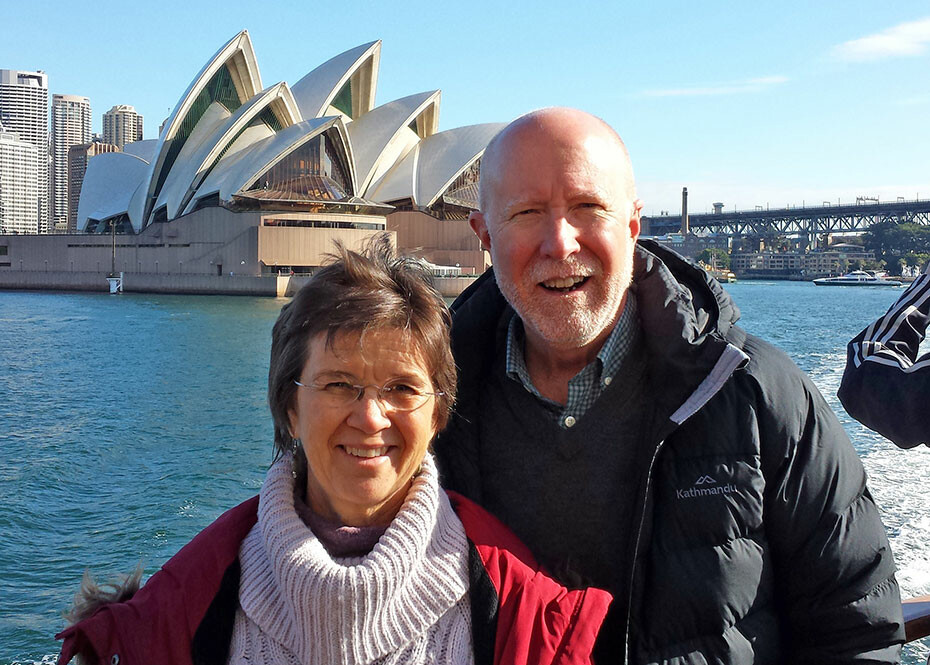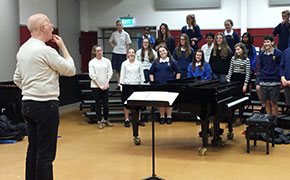SWU professor’s instruction takes him ‘down under’

Jul 29, 2015 | Fine Arts | Faculty | Academics: Fine Arts
SWU Music Professor Don Campbell with his wife Karen in front of Sydney Opera House. Campbell was invited to work with choruses and run workshops for directors and singers in New Zealand and Australia in May and June.
 Campbell goes over singing techniques with a chorus at Tawa College in Wellington, New Zealand. Campbell was invited to work with choruses and run workshops for directors and singers in New Zealand and Australia in May and June. The trip was organized through Barbershop Harmony Society (BHS) chapters in the two countries.
Campbell goes over singing techniques with a chorus at Tawa College in Wellington, New Zealand. Campbell was invited to work with choruses and run workshops for directors and singers in New Zealand and Australia in May and June. The trip was organized through Barbershop Harmony Society (BHS) chapters in the two countries.
Don Campbell, professor of music at Southern Wesleyan University, is keeping barbershop harmony alive and well, enthusiastically traveling the world to lend his expertise.
Barbershop singing, though born in the U.S., is now multinational and enjoyed by both male and female as they join voices to create pure harmony.
This past May and June, Campbell, along with his wife Karen, traveled “down under” to work with choruses and run workshops for directors and singers.
Jill Rodgers, one of Campbell’s former Harmony University students and currently director of education for Barbershop Harmony New Zealand (BHNZ), invited Campbell to travel across the Pacific to work with the choruses and their directors. Harmony University is sponsored by the Barbershop Harmony Society (BHS).
“I was just taken around and I was the expert from out of town. Being in my class, (Rodgers) thought I was the type of teacher who would work well with the teachers she works with,” Campbell said, adding that, through Harmony University he has traveled to many countries, including Scotland, the Netherlands, and Canada.
“Jill works with the director of education for BHA (Australia) to share my traveling expenses and to conduct workshops in New Zealand and Australia,” Campbell said. In addition to Rodgers, Campbell also worked with Charlotte Murray, a teacher at Tawa College in Wellington, New Zealand.
Campbell’s first stop was Auckland, where he worked with the City of Sails Chorus. He also traveled to Christchurch and to Wellington, New Zealand’s capitol. He then traveled to Australia, working with choruses and directors at Sydney, Adelaide, Brisbane and Hobart, a city on the island of Tasmania, which is an Australian state. Campbell spent two to three hours working with a choir from Tawa College group who was rehearsing for regional competition for The Big Sing, a New Zealand nationwide competition. Campbell noted that the group made it to the nationals.
At Christchurch, Campbell worked with a choir at Linwood College, which was composed mostly of low-income Polynesian students.
“They had a new choir director. This was a new choir, and they really didn’t know how to act, but we had a terrific time with them. I got them to understand what they could do. The kids came up to the teacher afterward and said ‘how did you get him here? Nobody ever comes here.’ She had tears in her eyes because she saw what those kids could do and what she needs to do to help,” Campbell said.
Campbell explained that New Zealand’s colleges are actually counterparts for American high schools, and the universities are equivalent to American colleges and universities.
“The plan for these workshops was to have singers and directors come and we would work with both of them in different aspects of what they need to have learned. I would work with the whole group, working on breathing and matching vowels, choral techniques,” Campbell said. “We would be all together and I would break out with the directors. Charlotte is a presentation coach – that means how one visually shares a song. Jill did more work with chorus sound, while I was teaching the directors how to be better directors.”
Working with various groups to improve their sound presents interesting challenges to Campbell, who says he never knows what is going to “hit” him when the singing starts.
“It’s much like a doctor walking into the patient in a waiting room and doing the same thing with voice lessons,” Campbell said.
Barbershop harmony is an American form of singing with American pronunciation, but just what is American pronunciation? Campbell uses American broadcasting as a guideline for pronunciation – speaking in a manner similar to people in his home state of California.
Campbell explained that a number of directors are not professional musicians or teachers – directing for them is a hobby.
“We teach them how to be better at their hobby,” he said.
There was also plenty of time for sightseeing, as the Campbells visited Australia’s Sydney Opera House, observed the Southern Cross, a constellation visible in the Southern Hemisphere, and visited New Zealand’s Hobbiton, where the “Lord of the Rings” and “The Hobbit” trilogies were filmed.
At this point in his long musical career, Campbell is living his dream. When asked about retirement, he said, “I don’t see in scripture where it calls for you to retire. I think God reassigns you.”